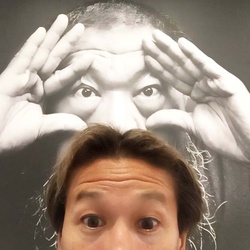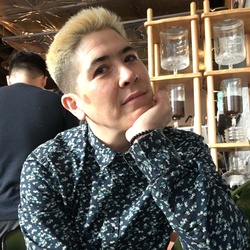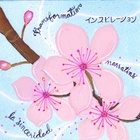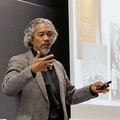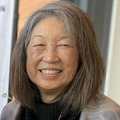The new season upon us is ushered in here by Los Angeles/Orange County-based riKu Matsuda and LA-born and raised Rick Noguchi, who each lend us two pieces that spring the many from memories and characters in our lives. There is a familiarity with the lessons learned and shared—of family, work values and awkward first jobs, to the fierce and funny heroes around us in community. Enjoy!
—traci kato-kiriyama
* * * * *
Rick Noguchi’s publications include two collections of poetry, The Ocean Inside Kenji Takezo (University of Pittsburgh Press, 1996), which won the Associated Writing Programs Award Series, and The Wave He Caught (Pearl Editions, 1995). He also published a children’s book Flowers from Mariko (Lee and Low Books, 2001). He received a Master’s in Fine Arts from Arizona State University and a Master’s in Business Administration from Pepperdine University. He currently works at the Japanese American National Museum as the chief operating officer.
With Her at All Times Ethel Nakano Carried a Sledgehammer
Everywhere she went, she swung the mallet with ease.
She never knew when she might need it.
At the supermarket, the bank, the autoclub, she kept
The tool nearby waiting for that exact moment
When a sledgehammer was necessary.
The occasions in which excessive pounding was required.
If a door needed to be forced open, Ethel Nakano was ready.
The instrument was a natural extension of her,
The long wood handle and solid iron head were a limb,
Another appendage, only very heavy on one end.
Ethel Nakano with her sledgehammer was endowed.
She was not at all large or burly, but well equipped she was
With centrigual force behind her. She could wreck easily
A hairdryer or an oven, a stone wall or a car,
In just one, maybe two, exacting blows.
She had the strength of gravity and she used it skillfully.
One hand gripping the base of the handle, the other
Choked up near the throat, she lifted the mallet above
Her head, then let the weight drop down to find its target.
This talent for smashing took her years to cultivate.
When she walked through town with her tool in hand,
Ethel Nakano appeared much taller, more threatening
Than she really was. But people who knew her knew
She was not a dangerous person. She was just
A kind woman, a good citizen, who welcomed
The opportunity to give a solid whack, the chance to slam
Her sledgehammer against another object.
Indeed, Ethel Nakano was often too quick on the draw.
A mishap once occurred after she heard
That a neighborhood cat was trapped in a mailbox.
While there was no celebrated rescue that day,
The damage she did is a permanent reminder to all
That Ethel Nakano was capable of destruction.
* This poem was first published in Asian American Poetry:
The Next Generation (University of Illinois Press, 2004)
and copyrighted by Rick Noguchi.
The Shoes of Buddy Katsuda
His shoes were made of water
And when he walked he flowed.
One foot after the other,
His stride kept him moving
Gracefully forward so that he strolled.
He floated.
His was the recognizable walk of elegance.
All the neighbors knew him:
The man who sauntered the streets
Each step full of piety.
He walked with the strength of the universe
Under his feet, yet no one knew
Where he went. He always drifted through
Gallantly, so distinguished in his meander.
If anyone tried to follow him,
His shoes were prone to a shift in tide.
He then gathered the momentum of a river—
He rushed, and in his rush he surged ahead
To walk the walk of a flash flood.
He cut a path
Clearing everything before him.
Behind him, he left a mess.
Welcome mats, lawn ornaments, cars scattered
Everywhere, yet his foot prints evaporated
Into air.
* This poem was first published on From the Fishouse in 2005
and copyrighted by Rick Noguchi.
* * * * *
riKu Matsuda is a mixed Nikkei queer trans man born in Garden Grove and raised in the Antelope Valley. In the early 1990s, his grandparents’ nursery was sold to Edison through eminent domain. Today, riKu frequents Evergreen Cemetery in Boyle Heights to gain inspiration and hope from his ancestors.
Spring Break, 1984
Vacations
are for working
and getting dirty
Nisei grandparents
rise at 5:30am
sleep by 8:30pm
A little TV before bed
but don’t forget
to turn it off
Exit Rosecrans off the 605
make two quick rights
follow curve to the left
Tropico Sales plant nursery
Under the power lines
next to the LA river
Easter is coming
thousands of lilies and palms
line the greenhouses
Job is to water not touch
no broken leaves, bruised flowers
waste water, waste money
Shoes and socks slip off
toes squish through mud puddles
fingertips caress each leaf and flower
* This poem is copyrighted by riKu Matsuda (2018)
Spring, 1994
Shapeshifting
from human to Easter Bunny
mom drops off at Antelope Valley Mall
“Sure you want to be in a costume?”
itchy, drenched, sweating buckets
no water, no pee breaks
skeptical children peer into plastic eyes
“Who’s in there?”
might pass out
or quit by day’s end
until adults begin to instruct kids
“Smile! Smile with Mr. Easter Bunny!”
each mister, each camera flash
sparks unfamiliar surge of wild joy
mom sees cheeks marked by deep smile lines
“I guess this is the job for you!”
* This poem is copyrighted by riKu Matsuda (2018)
© 2004/2005 Rick Noguchi; © 2018 riKu Matsuda




